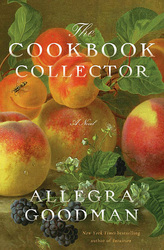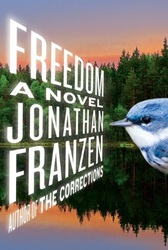|
At the risk of defending Jonathan Franzen more than he deserves -- because really, Freedom has some serious flaws -- I've got to admit that Gabriel Brownstein's thoughtful essay in The Millions got me thinking about the book again. In "The Big Show: Franzen, Goodman and 'The Great American Novel,'" Brownstein compares Freedom and Allegra Goodman's The Cookbook Collector, both critically-acclaimed, thoroughly absorbing social realist novels about affluent families in the big picture of contemporary America. And as he points out, the books really do have some striking similarities, in their concern with national and global politics, with the environment and technology, and with religion, beauty, and art. Brownstein's question is why, given that the novels are so similar, and that they were released in the very same year, was Franzen's considered a Great American Novel and Goodman's "just another good book by Allegra Goodman." Gender, of course, is a huge, insidious issue, as is marketing (which is never wholly divorced from gender). But putting all of that aside, and going into the books for a moment, I think the real difference is one of authorial attitude. Goodman loves her characters, while Franzen hates them. On the surface this might be victory Goodman. After all, there's probably no more damning charge against a writer than to say he hates his characters -- what right has he to write about them if he doesn't care for them at all? But actually I think Franzen wins here.
Goodman loves her characters, but she loves them a little too much. She wants them to find spiritual contentment and worldly success, much as an affluent parent might want for her children. And, after some pretty major losses and minor but affecting bruises, by and large, they do. It's remarkably satisfying if maybe a little too good to be true. Franzen, on the other hand, spares his characters nothing. They are unhappy people, despairing at the state of the world and loathing themselves at the same time, intelligent but short-sighted, charming but supremely selfish, and generally the kind of people you want to shake out of their foolish behavior. Humiliation abounds in Freedom, much of it self-inflicted. And yet, we stick with these people, hoping for some sort of turnaround, unlikely as we seem to get it. So when it comes (again, after some major losses and minor bruises), the redemption -- impartial, compromised, and incredibly human -- is almost a surprise, and profoundly moving. Both Franzen and Goodman seem to believe that people are essentially good and worthy of comfort -- but Franzen holds that view rather grudgingly, as though he has too much reason to believe otherwise, but can't help himself in the end. The Great American Novel moniker aside (because, really, what good is it?), both novels strike me as thoroughly American. It's just that Goodman has a little more faith in our country, and Franzen, a little more doubt -- a larger sense of our culpability in the world that we have made.
9 Comments
I'm not sure I completely agree on Franzen. I think hatred, inevitably, is either caused by/causes objectification. And Franzen's characters have always seemed flat to me, partly for that reason. But also because they seem like mere windup toys for his plots' machinations (not as bad as Richard Powers (whom I like, btw), but still pretty bad).
Reply
Katherine
2/22/2011 04:08:24 am
Yeah of course it has to do with his celebrity/marketing. But for the moment I'm not interested in that. And really, I'm not interested in GAN debates, ever. I'm interested in why his baggy, multi-themed, way-we-live-now novel might ultimately register more deeply than other (quite accomplished) books of that variety. And I do think his attitude -- which isn't really hate after all -- has a lot to do with it.
Reply
Matt K
2/22/2011 04:53:28 am
What about the fact that Goodman's novel doesn't have a searching-for-one's-wedding-ring-amid-pile-of-own-feces scene? I think we're underplaying that factor.
Reply
Lauren B.
2/22/2011 06:05:30 am
If one has read neither (minus the free Kindle sample of 'Freedom'), which would you recommend reading first?
Reply
Oh, I'm going to start a blog called In Search of the GAN. And I'm going to harass you into commenting on it all the time. And you'll love it.
Reply
Katherine
2/22/2011 09:30:31 am
@Lauren: I think you could start with either. Both thoroughly enjoyable. It really depends your personal taste and temperament. I read Franzen first, then Goodman, which is probably a sane approach, since Franzen often leaves readers feeling pretty down and Goodman isn't compared to Jane Austen for nothing.
Reply
Mali
2/24/2011 03:59:48 am
I have to side with Dave G. here. I wouldn't go so far as to say that Franzen is entirely indifferent to his characters' interiority, but I wasn't wholly convinced by (or invested in) any of them. I think his attempts at characterization are laundered through such hyperbolic situations that none of it really rings true. I wasn't touched. Then again, I do have a cold, cold heart.
Reply
Leave a Reply. |
Aboutauthor of The Violet Hour, reader, prodigious eater of ice cream Archives
June 2014
Categories
All
|


 RSS Feed
RSS Feed